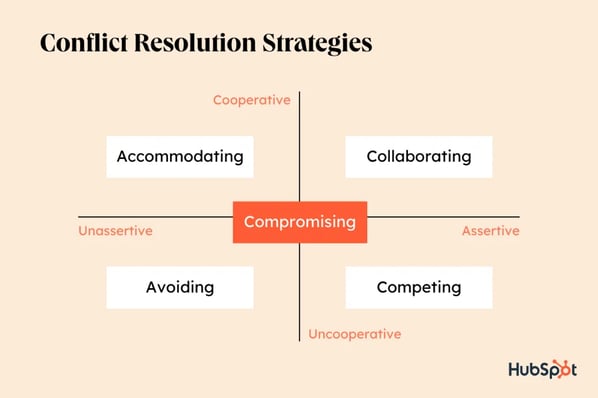
Resolving Project Conflicts
Resolving Project Conflicts
In this article, we will explore effective strategies for resolving project conflicts. From managing diverse teams to navigating tight deadlines, project conflicts can arise in various forms. However, by implementing the right techniques and communication strategies, you can effectively address and resolve these conflicts, ensuring smoother project execution and improved team dynamics. Whether you are a project manager or a team member, these strategies will equip you with the skills needed to handle project conflicts with confidence and professionalism. So, let’s dive in and discover how to navigate the challenges that arise when working on projects.
Speak to MCTC today about our consultancy advice and training packages.
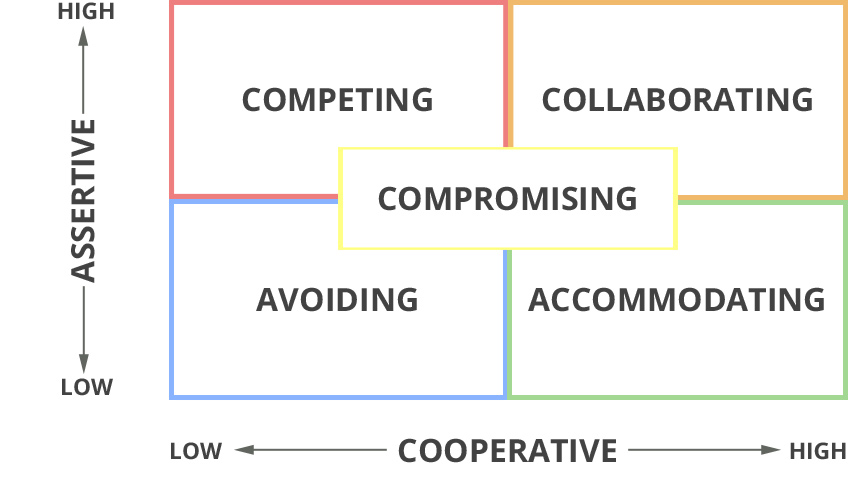
Understanding Project Conflicts
Project conflicts are an inevitable part of any team-based work environment. These conflicts can arise due to various reasons and can have a significant impact on the overall success of a project. By understanding the types and causes of conflicts, as well as their potential impact, you can better navigate and manage conflicts that may arise in your projects.
Types of conflicts
Conflicts within a project can take on several forms. Some of the most common types of conflicts include:
- Task-related conflicts: These conflicts arise when team members have different opinions or ideas about how to accomplish a specific task or goal.
- Interpersonal conflicts: Interpersonal conflicts occur when there are disagreements, misunderstandings, or clashes of personalities between team members.
- Role conflicts: Role conflicts arise when there is confusion or overlap regarding team members’ responsibilities and roles within the project.
- Resource conflicts: Resource conflicts occur when team members compete for limited resources, such as time, funding, or equipment.
Understanding the different types of conflicts can help you identify and address them more effectively.
Causes of conflicts
Conflicts in project management can stem from various sources. Some common causes of conflicts include:
- Differences in opinions and perspectives: Team members may have different viewpoints and ways of approaching tasks, leading to conflicts.
- Unclear goals and expectations: When project goals and expectations are not clearly defined, conflicts can arise due to misunderstandings and confusion.
- Poor communication: Ineffective or insufficient communication among team members can lead to misinterpretations, assumptions, and conflicts.
- Personality clashes: Differences in personalities, working styles, and communication preferences can contribute to conflicts within a project team.
- Limited resources: Scarcity of resources, such as time, budget, or personnel, can cause conflicts as team members compete for these limited resources.
Understanding the underlying causes of conflicts can help you address the root issues and prevent conflicts from escalating.
Impact of conflicts
Conflicts within a project can have negative consequences on both the team dynamics and the overall project success. Some of the potential impacts of conflicts include:
- Reduced productivity: Conflicts can distract team members from their tasks, resulting in delays and decreased productivity.
- Poor team morale: Prolonged conflicts can create a negative work environment, leading to low team morale and decreased motivation.
- Wasted time and resources: Resolving conflicts takes time and effort, diverting valuable resources away from project activities.
- Damaged relationships: Conflicts can strain relationships among team members, leading to a breakdown in trust and collaboration.
- Missed deadlines and project failure: If conflicts are left unresolved, they can escalate and ultimately derail the project, resulting in missed deadlines and project failure.
Understanding the potential impact of conflicts underscores the importance of actively managing and resolving conflicts in a project.
Preventing Project Conflicts
While conflicts are inevitable, proactive measures can be taken to prevent conflicts from arising or escalating within a project. By establishing clear goals and expectations, creating a positive team culture, ensuring effective communication, and holding regular team meetings, project managers can mitigate the risk of conflicts occurring.
Establishing clear goals and expectations
One of the primary causes of conflicts is the lack of clarity regarding project goals and expectations. To prevent conflicts, it is crucial to establish clear and specific goals, as well as define the roles and responsibilities of each team member. This clarity helps ensure alignment and minimises misunderstandings, reducing the likelihood of conflicts arising.
Creating a positive team culture
A positive team culture can play a significant role in preventing conflicts. By fostering an environment of trust, respect, and open communication, team members are more likely to work collaboratively and address potential conflicts proactively. Encouraging team members to appreciate and celebrate each other’s contributions can also contribute to a positive team culture.
Effective communication
Effective communication is vital for preventing conflicts. Regularly updating team members on project progress, providing timely feedback, and ensuring that communication channels are open and accessible can minimise misunderstandings and potential conflicts. Encouraging active listening and promoting a culture of transparency can also enhance communication within the project team.
Regular team meetings
Regular team meetings provide a platform for addressing potential conflicts early on. By bringing team members together, project managers can encourage open dialogue, address concerns or conflicts, and foster a collaborative and problem-solving mindset. These meetings also allow for the opportunity to provide updates, clarify expectations, and reinforce the team’s shared goals.
Identifying Project Conflicts
As a project manager, it is essential to be able to recognise and identify conflicts as early as possible. By actively listening, observing team dynamics, and monitoring project progress, you can detect signs of conflicts and take appropriate measures to address them promptly.
Active listening
Active listening is a crucial skill for identifying conflicts. By actively listening to team members during meetings, conversations, or discussions, you can pick up on any disagreements, frustrations, or unresolved issues that may indicate potential conflicts. Pay attention to verbal and non-verbal cues, such as tone of voice, body language, or expressions, that may indicate underlying conflicts.
Observing team dynamics
Team dynamics can provide valuable insights into potential conflicts. Observe how team members interact with each other, whether there are signs of tension, or if certain individuals seem excluded or unheard. Changes in team dynamics, such as increased disagreements or decreased collaboration, may indicate the presence of conflicts.
Monitoring project progress
Monitoring project progress can also help identify conflicts. If there are delays, missed deadlines, or increased errors and rework, these could be indicators of conflicts within the project. By regularly reviewing project metrics and analysing performance data, you can identify any potential issues that may require further investigation and resolution.
Resolving Project Conflicts
When conflicts do arise within a project, it is important to address them promptly and effectively. By addressing conflicts early, utilising mediation techniques, engaging in collaborative problem-solving, and seeking third-party assistance if needed, conflicts can be resolved in a constructive manner that allows the project to move forward.
Addressing conflicts early
Early intervention is crucial for resolving conflicts before they escalate. As soon as a conflict is identified, project managers should initiate an open and honest conversation among the involved parties. Encourage individuals to express their concerns, actively listen to all perspectives, and work towards a mutual understanding of the underlying issues. Timely intervention can prevent conflicts from intensifying and facilitate a quicker resolution.
Utilising mediation techniques
In cases where conflicts involve multiple parties or are more complex, mediation techniques can be beneficial. A neutral third party can facilitate the conversation and guide the conflicting parties towards finding a mutually agreeable solution. Mediation techniques, such as active listening, re-framing the issues, and brainstorming potential solutions, can help create a safe and productive space for resolving conflicts.
Collaborative problem-solving
Collaborative problem-solving involves bringing the conflicting parties together to work towards a shared resolution. Encourage open dialogue, active listening, and brainstorming of potential solutions. By focusing on common objectives and seeking win-win outcomes, conflicting parties can find mutually beneficial solutions and repair any damaged relationships. Emphasise the importance of teamwork and collaboration throughout the problem-solving process.
Seeking third-party assistance
In some cases, conflicts may be too complex or deeply entrenched to resolve internally. In such situations, seeking third-party assistance, such as a mediator, arbitrator, or consultant, can be beneficial. These neutral parties can provide an objective perspective, mediate discussions, and help guide the conflicting parties towards a resolution. Engaging external assistance can help break deadlock situations and ensure a fair and balanced resolution.
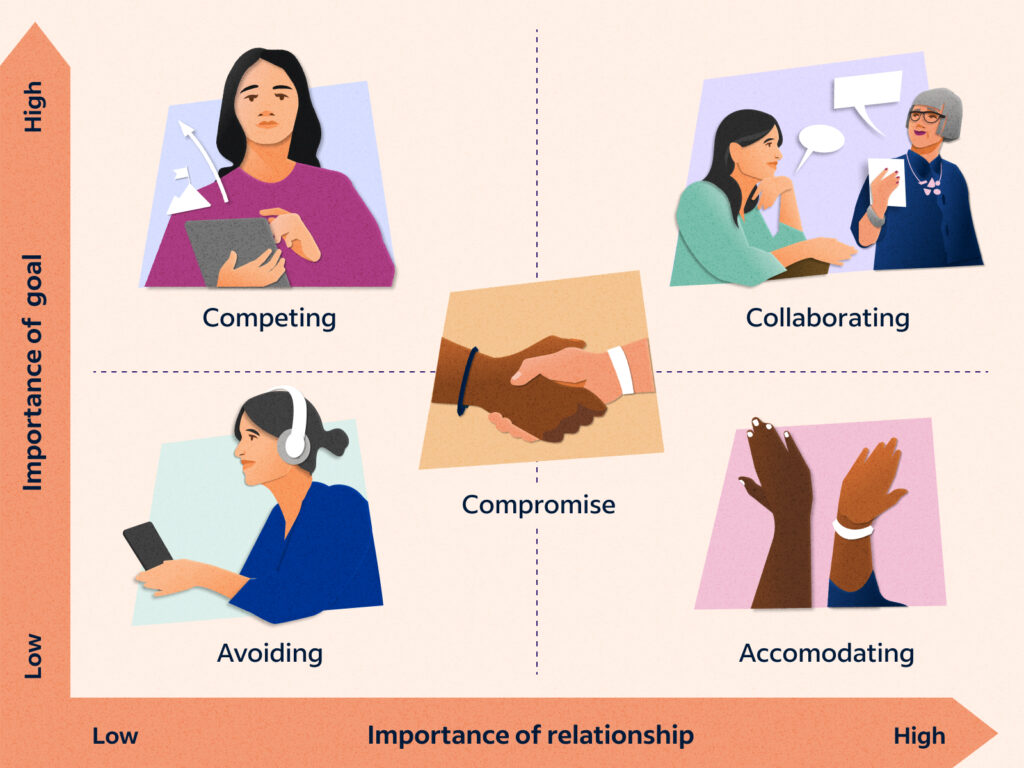
Promoting Collaboration
Promoting collaboration within a project team can significantly reduce the likelihood of conflicts arising. By encouraging open dialogue, promoting a culture of respect, and fostering teamwork, project managers can create an environment where collaboration is valued and conflicts are less likely to occur.
Encouraging open dialogue
Open dialogue is essential for effective collaboration. Encourage team members to freely express their opinions, concerns, and ideas. Create a safe and non-judgemental space where everyone feels comfortable contributing to discussions. By valuing diverse perspectives and encouraging individuals to speak up, you can prevent conflicts caused by misunderstandings or lack of input.
Promoting a culture of respect
Respect is a key component of collaboration and conflict prevention. Foster a culture where team members respect each other’s ideas, expertise, and differences. Encourage individuals to actively listen, consider alternative viewpoints, and avoid personal attacks or aggressive behaviour. By promoting respect within the team, you can create an environment where conflicts are less likely to occur.
Fostering teamwork
Teamwork is essential for successful project delivery and conflict prevention. Encourage cooperative and collaborative behaviours among team members. Foster a sense of shared purpose and common goals. Encourage individuals to support and help each other, leverage each other’s strengths, and work together towards achieving project objectives. By fostering a strong sense of teamwork, conflicts are less likely to arise as individuals feel a collective responsibility for project outcomes.
Managing Different Perspectives
Projects often involve individuals with varying backgrounds, experiences, and perspectives. Effectively managing different perspectives can prevent conflicts and enhance project outcomes. Recognising individual differences, embracing diversity, and finding common ground can help create a harmonious and inclusive project environment.
Recognising individual differences
Every individual brings their unique set of skills, knowledge, and experiences to a project. Recognise and appreciate these individual differences, as they can contribute to innovative solutions and better outcomes. Respect and value diverse perspectives, and encourage team members to leverage their individual strengths. By recognising individual differences, conflicts stemming from misunderstandings or lack of appreciation can be minimised.
Embracing diversity
Diversity is an asset in project management. Embrace diversity in all its forms, including differences in gender, age, cultural background, and professional experiences. Create an inclusive environment where everyone feels heard, valued, and respected. By fostering diversity, you can tap into a broader range of ideas and perspectives, leading to more robust project outcomes and reduced conflicts.
Finding common ground
Even with different perspectives, it is crucial to find common ground among team members. Identify shared project goals and objectives that can serve as a unifying force. Encourage individuals to focus on what they have in common rather than their differences. By finding common ground, conflicting parties can bridge their diverging views and work towards a mutually agreeable solution.
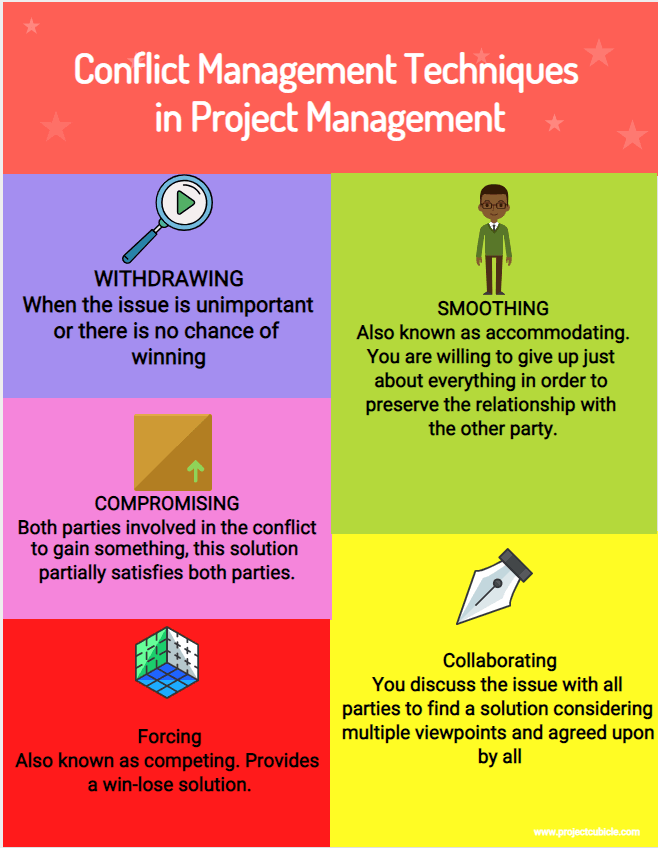
Negotiation and Compromise
Negotiation and compromise are essential skills for resolving conflicts in project management. By utilising effective negotiation strategies, seeking win-win solutions, and being willing to compromise for the greater good, conflicts can be resolved in a way that satisfies all parties involved.
Effective negotiation strategies
Negotiation involves finding a middle ground that satisfies the interests of all parties. Utilise effective negotiation strategies, such as active listening, maintaining open lines of communication, and clearly articulating your needs and interests. Look for mutually beneficial solutions that address the underlying concerns of all parties involved.
Finding win-win solutions
A win-win solution is one that meets the needs and interests of all conflicting parties. Rather than focusing on “winning” the conflict, prioritise finding solutions that benefit everyone involved. Encourage creative problem-solving and brainstorming of alternative options. By exploring multiple solutions, you increase the likelihood of finding win-win outcomes that resolve conflicts amicably.
Compromising for the greater good
Sometimes, conflicts require compromise from all parties involved. Be willing to make concessions and find middle ground that serves the overall project goals. In situations where no perfect solution exists, compromising for the greater good may be necessary. Emphasise the importance of collaboration and teamwork to encourage individuals to prioritise the project’s success over personal preferences.
Strengthening Leadership
Strong leadership is vital for effectively managing conflicts within a project. By building trust and credibility, setting clear expectations for behaviour, and providing support and guidance, project managers can foster an environment that minimises conflicts and promotes positive team dynamics.
Building trust and credibility
Trust is the foundation of effective leadership and conflict management. Build trust among team members by consistently demonstrating integrity, transparency, and fairness. Be reliable and follow through on commitments. Encourage open and honest communication, and ensure confidentiality when necessary. By establishing trust and credibility, team members are more likely to share their concerns openly and work towards resolving conflicts collaboratively.
Setting clear expectations for behaviour
Leaders must set clear expectations for acceptable behaviour within the project team. Define standards of professionalism, respect, and collaboration. Clearly communicate the consequences of inappropriate behaviour or conflict escalation. By setting clear expectations for behaviour, individuals are more likely to adhere to these standards, reducing the likelihood of conflicts arising.
Providing support and guidance
Leadership involves providing support and guidance to team members. Be available and approachable to address any issues or concerns that team members may have. Provide guidance on conflict resolution strategies and techniques. Offer coaching or training opportunities to enhance the conflict management skills of team members. By providing support and guidance, leaders can equip team members with the tools they need to navigate and resolve conflicts effectively.
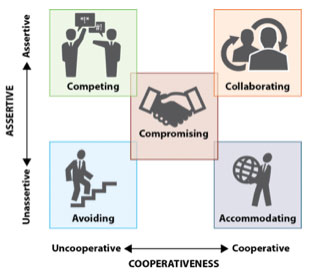
Learning from Conflicts
Conflicts provide valuable learning opportunities that can be used to improve future project outcomes. By identifying lessons learned, implementing process improvements, and promoting a continuous learning environment, project managers can ensure that conflicts contribute to personal and organisational growth.
Identifying lessons learned
After resolving a conflict, take the time to reflect and identify the key lessons learned. Consider the root causes of the conflict, the strategies used to resolve it, and the outcomes achieved. Use these lessons to enhance your conflict management skills and inform future decision-making and problem-solving processes.
Implementing process improvements
Conflicts often highlight areas for improvement within project processes and systems. Analyse the conflict in the context of the project’s overall framework and identify any process gaps or weaknesses that contributed to the conflict. Implement improvements to prevent similar conflicts from arising in future projects. This could involve revising communication protocols, clarifying roles and responsibilities, or enhancing resource allocation processes.
Promoting a continuous learning environment
Create an environment that values continuous learning and growth. Encourage team members to share their experiences and insights gained from resolving conflicts. Foster a culture where individuals feel comfortable discussing conflicts openly and seeking feedback from their peers and leaders. By promoting a continuous learning environment, conflicts become opportunities for personal and organisational development.
Utilising Conflict Resolution Tools
Tools and frameworks can assist project managers in effectively managing and resolving conflicts. By utilising conflict resolution models, communication tools, and decision-making frameworks, project managers can enhance their conflict management skills and facilitate successful conflict resolution.
Conflict resolution models
Conflict resolution models provide a structured approach to resolving conflicts. Models such as the Thomas-Kilmann Conflict Mode Instrument or the Win-Win Approach can help guide the conflict resolution process by providing a step-by-step framework. These models often involve steps like identifying the underlying causes of the conflict, exploring alternative solutions, and reaching a mutually agreeable resolution.
Communication tools
Effective communication is essential for conflict resolution. Utilise communication tools such as active listening techniques, constructive feedback frameworks, and conflict resolution scripts to enhance your communication skills in conflict situations. These tools can help you navigate difficult conversations, express your concerns clearly, and foster a collaborative environment for conflict resolution.
Decision-making frameworks
Conflicts often involve decision-making processes. Utilise decision-making frameworks such as the Decision-Making Matrix or the Analytical Hierarchy Process to facilitate sound, fair, and objective decision-making in conflict resolution. These frameworks provide a structured approach to evaluating options, considering different perspectives, and making informed decisions that address the underlying concerns of conflicting parties.
By leveraging conflict resolution tools, project managers can approach conflicts in a systematic and proactive manner, increasing the likelihood of successful resolutions.
In conclusion, conflict management is an essential skill for project managers. By understanding the types and causes of conflicts and their potential impact, project managers can be better prepared to prevent, identify, and resolve conflicts within their projects. Through proactive measures such as establishing clear goals and expectations, creating a positive team culture, and promoting effective communication, conflicts can be minimised. When conflicts do arise, addressing them early, utilising mediation techniques, and promoting collaborative problem-solving can facilitate resolution. By embracing diversity, negotiating and compromising, and strengthening leadership, project managers can create an environment that promotes positive team dynamics and minimises conflicts. Learning from conflicts and utilising conflict resolution tools further enhances conflict management skills and contributes to continuous improvement within projects.
